Affiliate marketing actively boosts both upper- and lower-funnel goals—56 percent of marketers use affiliate marketing to increase brand awareness and 50 percent use it to close sales. Publishers and affiliates are also cashing in—the average annual salary of an affiliate marketer is just over than $63,000, while many earn significantly more.
impact.com’s Associate Manager of Product Marketing, Matt Moore, sat down with industry experts to discuss the growing value of business-to-business (B2B) affiliate programs, best practices, and how to build long-lasting partner relationships.
Index
- What is B2B affiliate marketing?
- The three key players
- Affiliates act as testers for brands
- B2B vs B2C affiliate marketing
- KPIs to track in B2B affiliate partnerships
- Why is using an affiliate platform important?
- Use the full marketing funnel
- Use the right payment models
- Final thoughts from the experts
These top industry experts shared their wisdom on Cloud Software Association’s insightful podcast:
- Keemia Ferasat, Manager of Global Affiliate Marketing & Partnerships at Microsoft 365
- Tye DeGrange, CEO of Round Barn Labs
- Zoe Mackay, Strategic Partnership Manager at Technology Advice
What is B2B affiliate marketing?
Affiliate marketing is a performance-based marketing channel where brands reward individuals or businesses for creating awareness and driving website traffic, leads, signups, conversions, and sales.
When an affiliate joins a brand’s affiliate program, the brand gives unique, trackable links to the affiliate to promote the brand. Affiliates can add these links to their websites, social media accounts, and email campaigns. Potential customers click on these links and get redirected to the brand’s website to make a purchase.
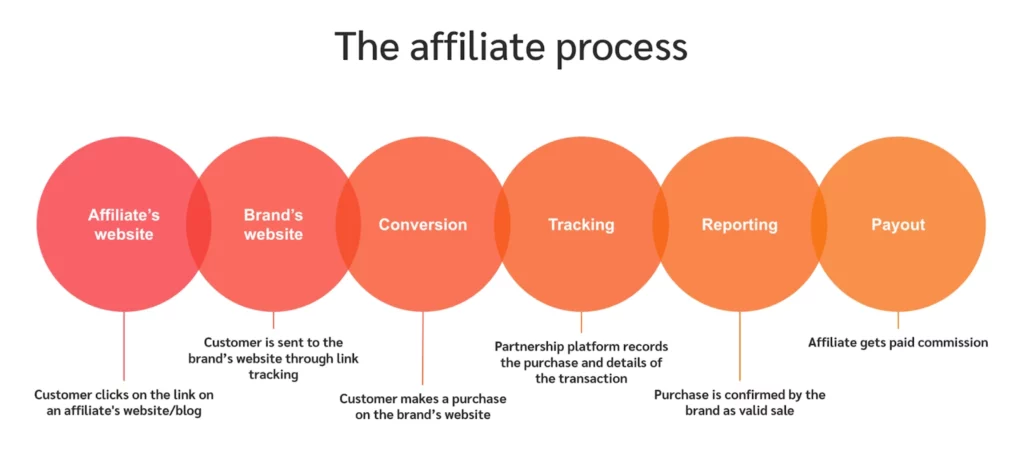
Business-to-business (B2B) target audiences differ from business-to-customer (B2C) target audiences. B2B brands have a more focused and well-defined target audience. Their products appeal to a specific niche, such as software for marketers or tools for accountants.
The three key players that make affiliate partnerships possible
There are three key players in affiliate marketing partnerships:
The brand
The brand is the merchant or company selling a product or service. Companies partner with affiliates to spread the word about their business and drive sales. Brands pay a commission to affiliates for leads, signups, sales, or clicks to their website.
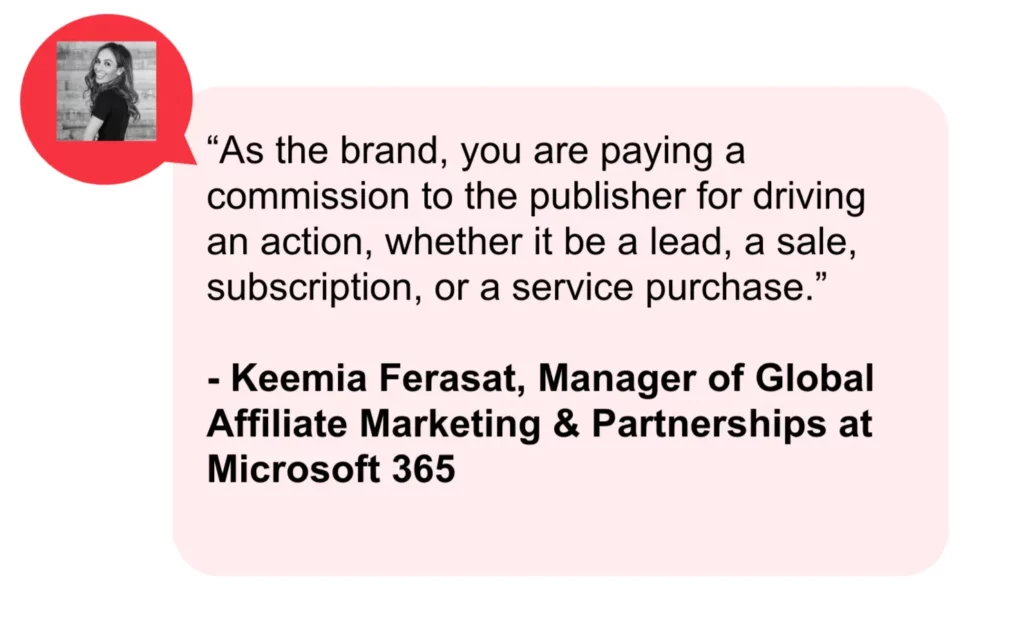
The agency
Agencies can form collaborations between brands and affiliates. They secure a beneficial match for both parties to ensure good alignment and communication across the board. Agencies also scope the best technology to benefit the ecosystem and simplify collaboration between parties.
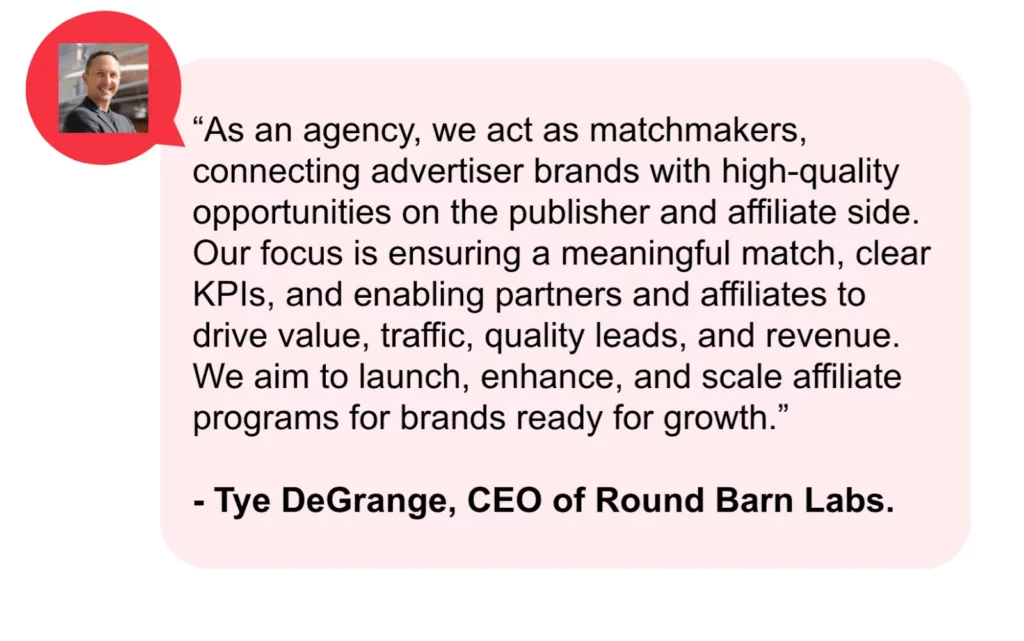
The publisher/affiliate
The affiliate is a publisher or partner that promotes products or services. Affiliates generally own a website or social property, and promote an advertiser’s brand through trackable links. This could be a blog post, coupon page, product review, social media, advertising banner, product comparison portal, newsletter, or email campaign.
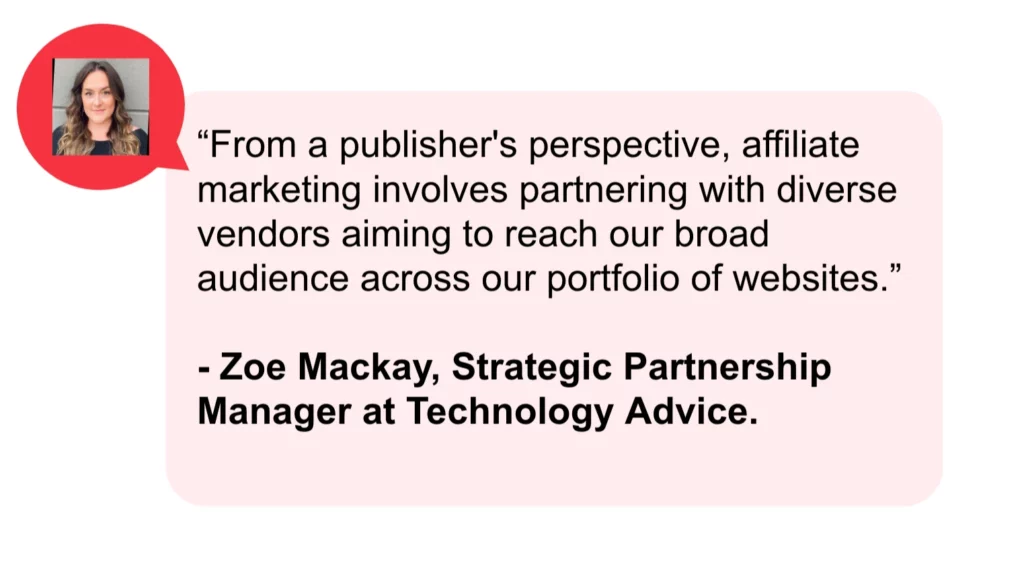
Affiliates act as outsourced testers for brands
To gain true insight into whether your affiliate program is working for your brand, you have to conduct multiple tests. There isn’t a one-size-fits-all approach, so testing will give you the insight you need.
For publishers, landing page testing provides essential information on what readers want to see more of.
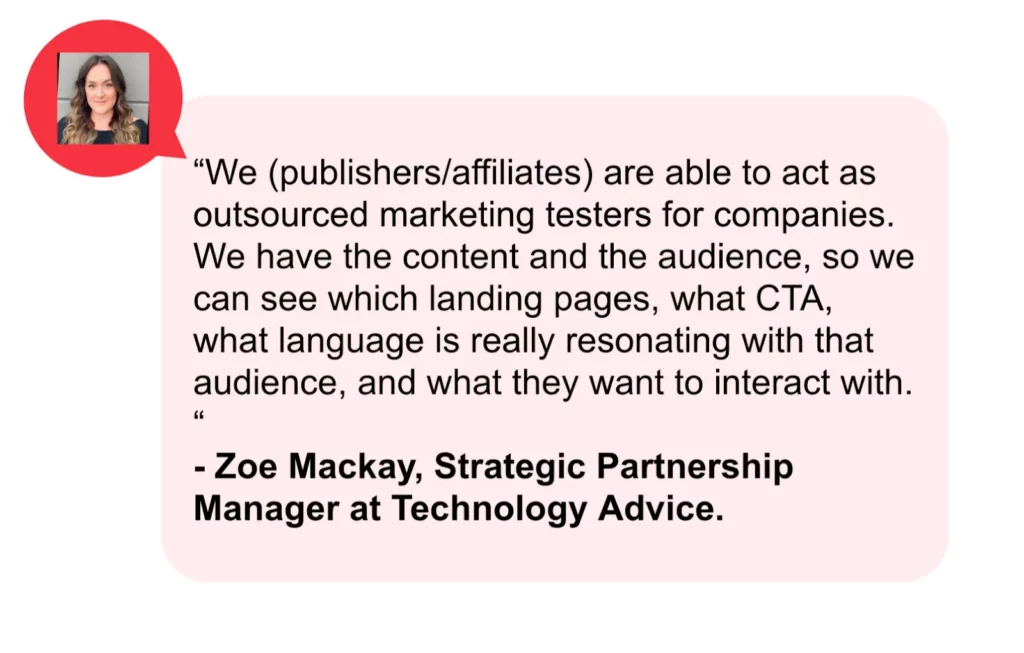
Tye also notes how affiliates can be great resources for your team and play a key role in campaign testing.
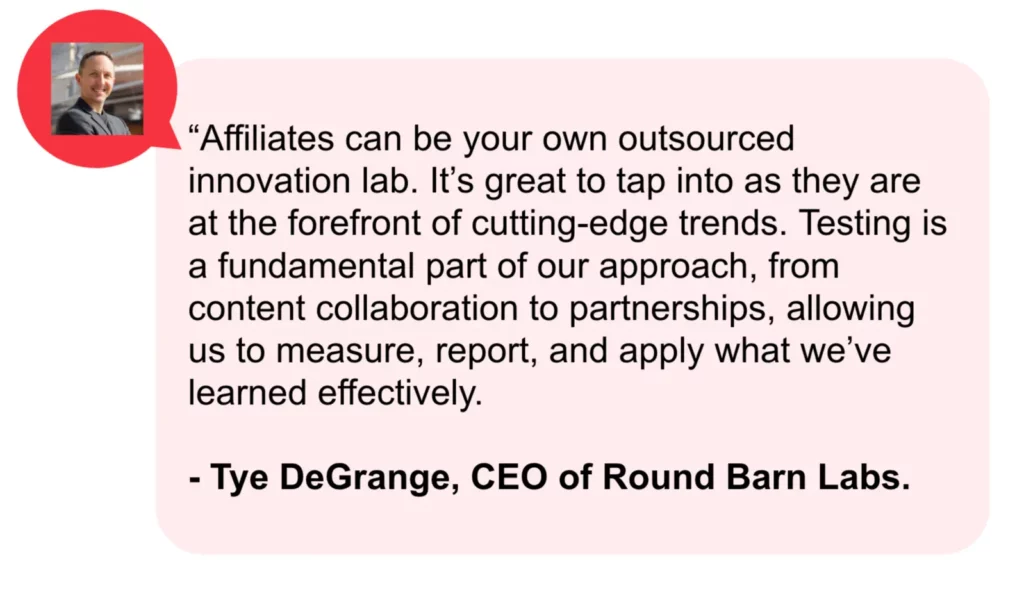
B2B vs B2C affiliate marketing
The one thing B2B and B2C businesses have in common is that they both want to sell a product or service. However, the approach to achieving this goal differs slightly. Firstly, the target audience for B2B is more professional, and they’re looking for products and services that solve business-related problems. On the other hand, when B2C customers shop, they’re looking for ways to enhance their personal lives with things like entertainment, food, and clothing.
Secondly, the promotional methods also vary. B2B affiliates often focus more on educational material, such as in-depth reviews and comparisons between competing solutions, whereas B2C affiliates focus more on email campaigns and short videos. Brands, agencies, and publishers prioritize different metrics to measure the success of campaigns and optimize them further.
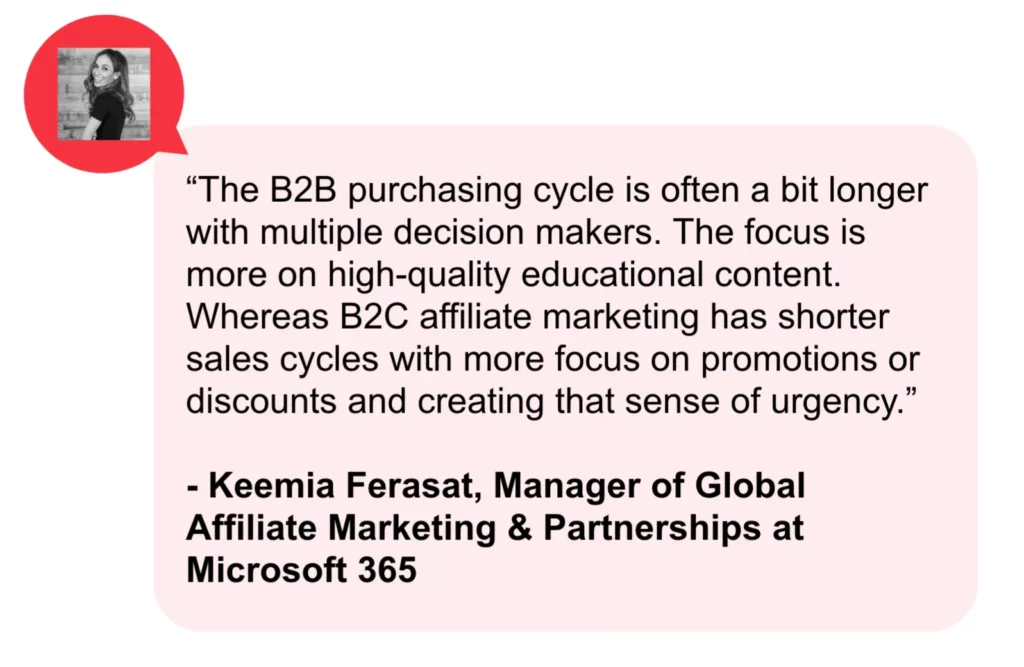
KPIs to track in B2B affiliate partnerships
Keep the following metrics in mind when you track affiliate programs:
Conversion rate
One of the most popular metrics, conversion rate, shows how many link clicks have led to an action. It’s also helpful for tracking individual affiliate performance and seeing which affiliate converts customers the best, giving brands insight into nurturing the right affiliates.
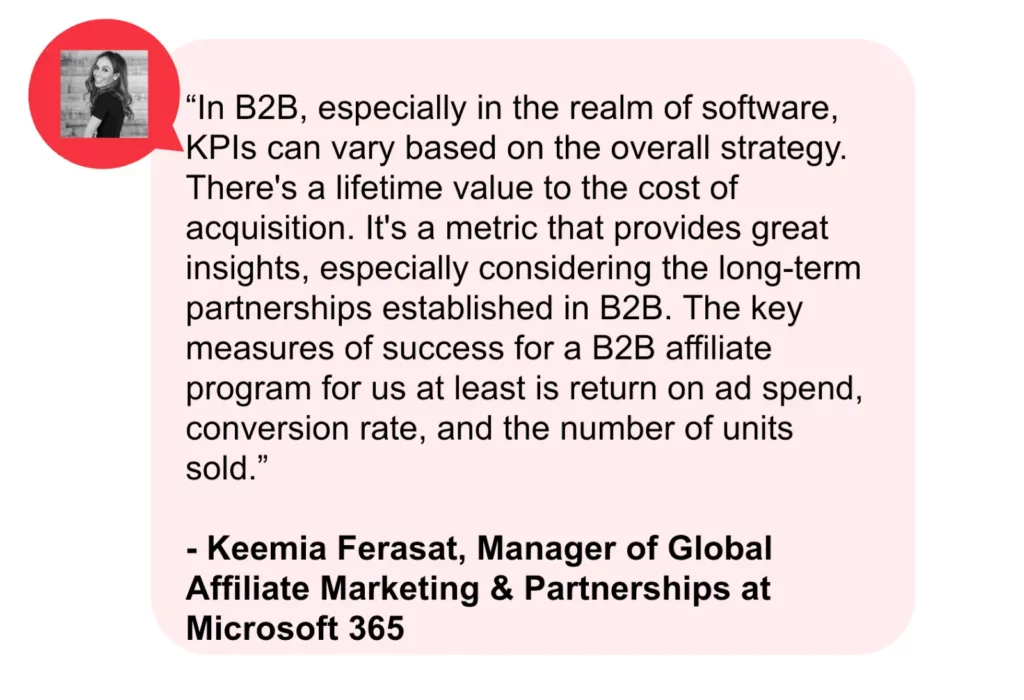
Return on investment (ROI)/Return on ad spend (ROAS)
This metric is crucial for any business to understand how effective an affiliate program is for every dollar they spend. In short, it is the total revenue generated from your affiliate program once you have subtracted all the costs associated with creating and maintaining the program.
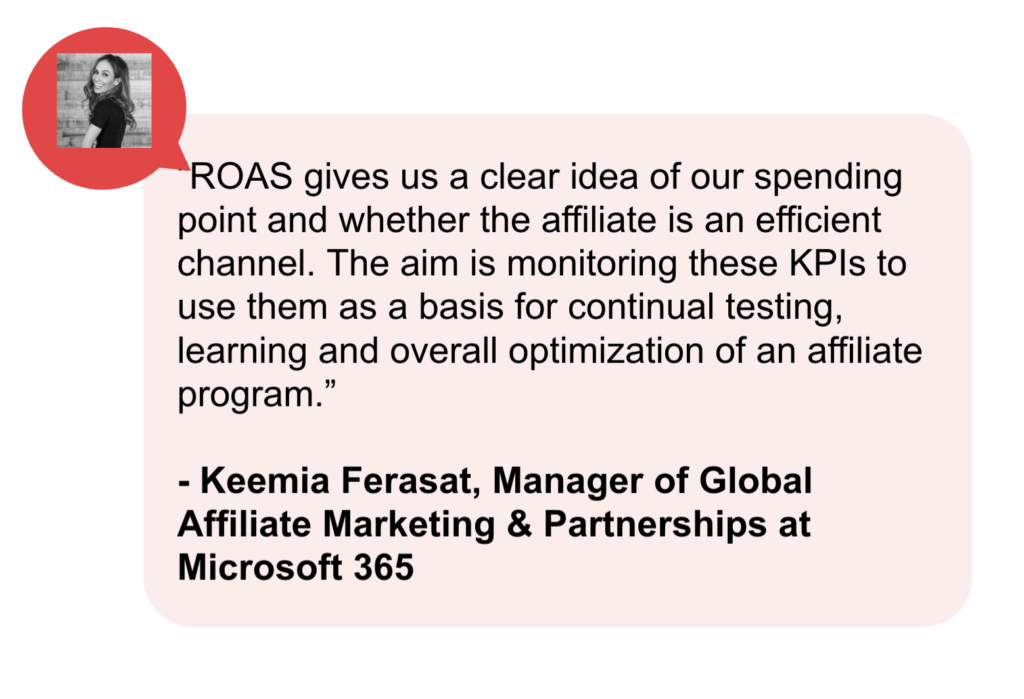
Overall engagement
Tracking overall engagement with an affiliate program can help you determine whether it’s worthwhile investing further. You can track the number of visitors to your website from the affiliate links or the conversions generated from the links.
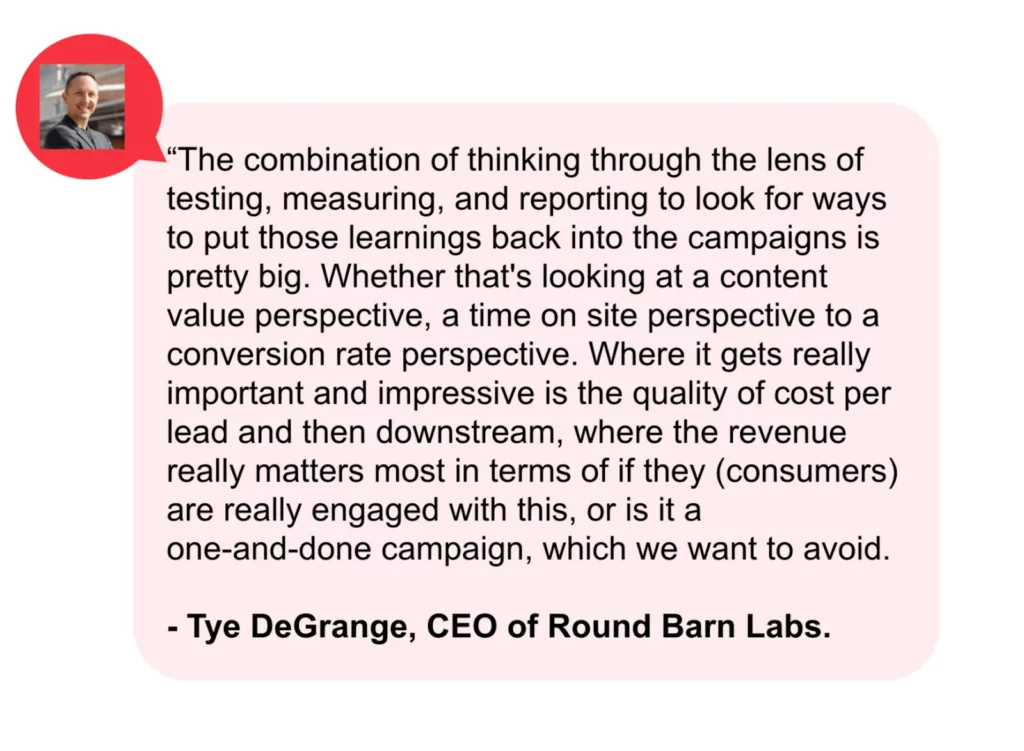
Why is using an affiliate platform important?
An affiliate platform automates processes between partners, helping to build long-term relationships. Long-term partnerships can be worthwhile to invest in and beneficial for all parties.
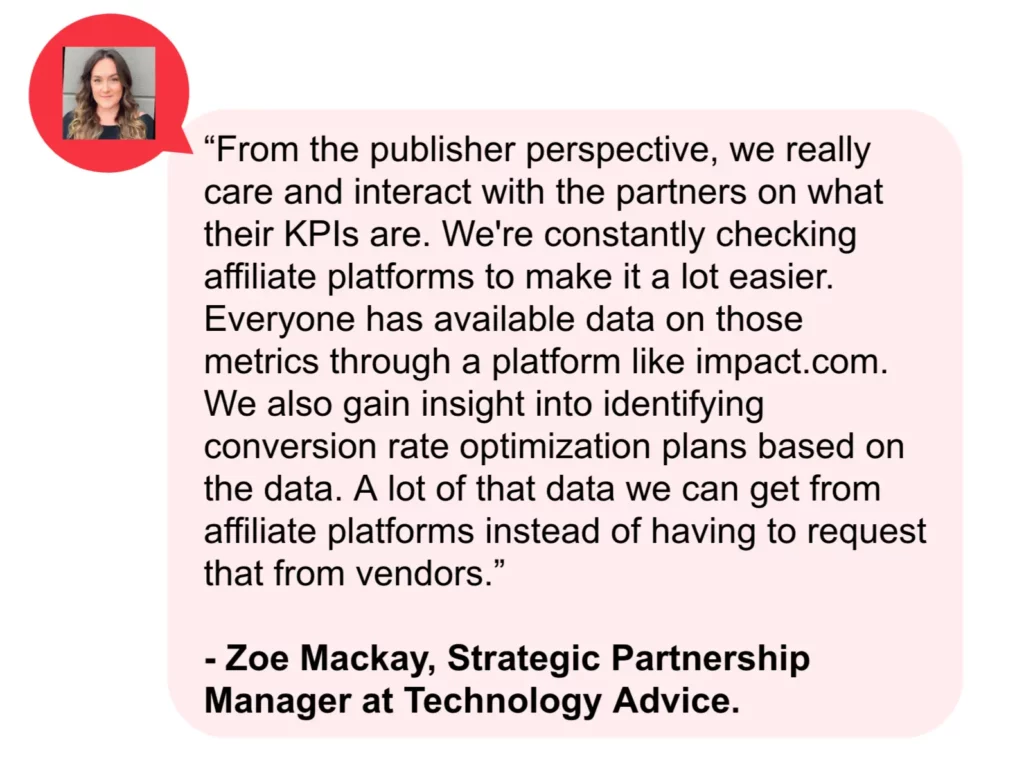
Affiliate platforms streamline relationships across the entire affiliate life cycle from recruiting partners to paying them and optimizing campaigns. So, instead of requiring a team to track sales or commissions manually, the software saves time and avoids mistakes by managing the whole process.
Additionally, a partnership platform adds an extra layer of security for you and your partners.

Use the full marketing funnel
Both upper- and lower-funnel partners are important in affiliate marketing. Upper-funnel partners help raise brand awareness and provide educational content in the B2B space, while lower-funnel partners drive conversions in the longer-term decision-making process. A mixed approach of revenue generating and brand awareness goals is ideal, particularly in the B2B space where purchasing takes much longer.
Contrary to popular belief, publishers can offer brands value for the full funnel, and not just the last-click.
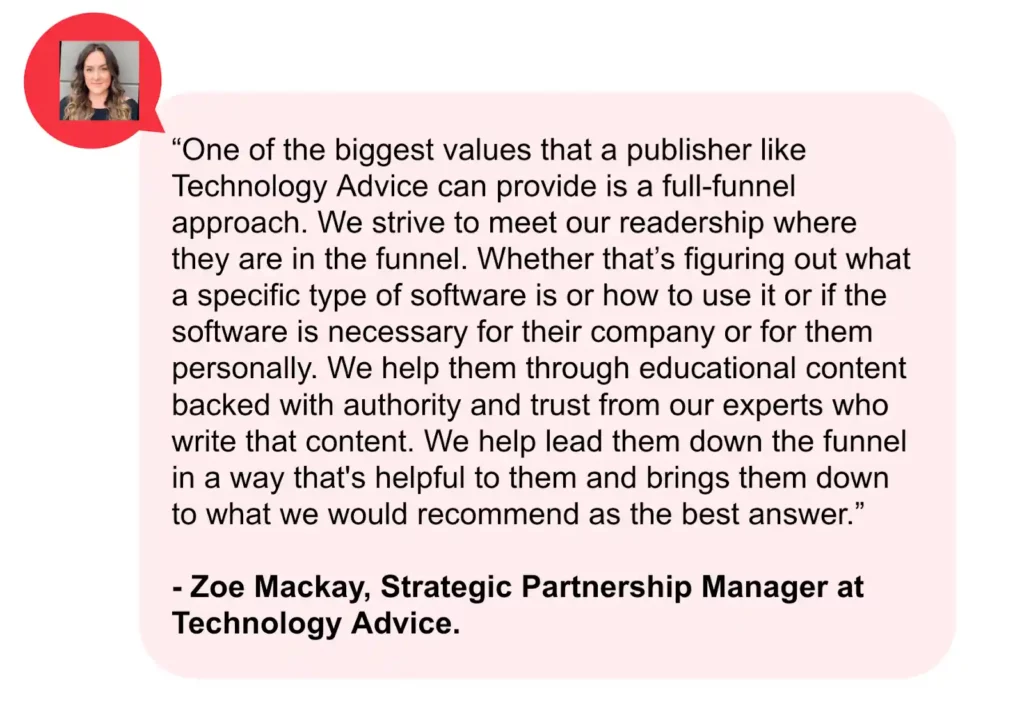
Zoe also notes the importance of generating brand awareness instead of only focusing on sales.
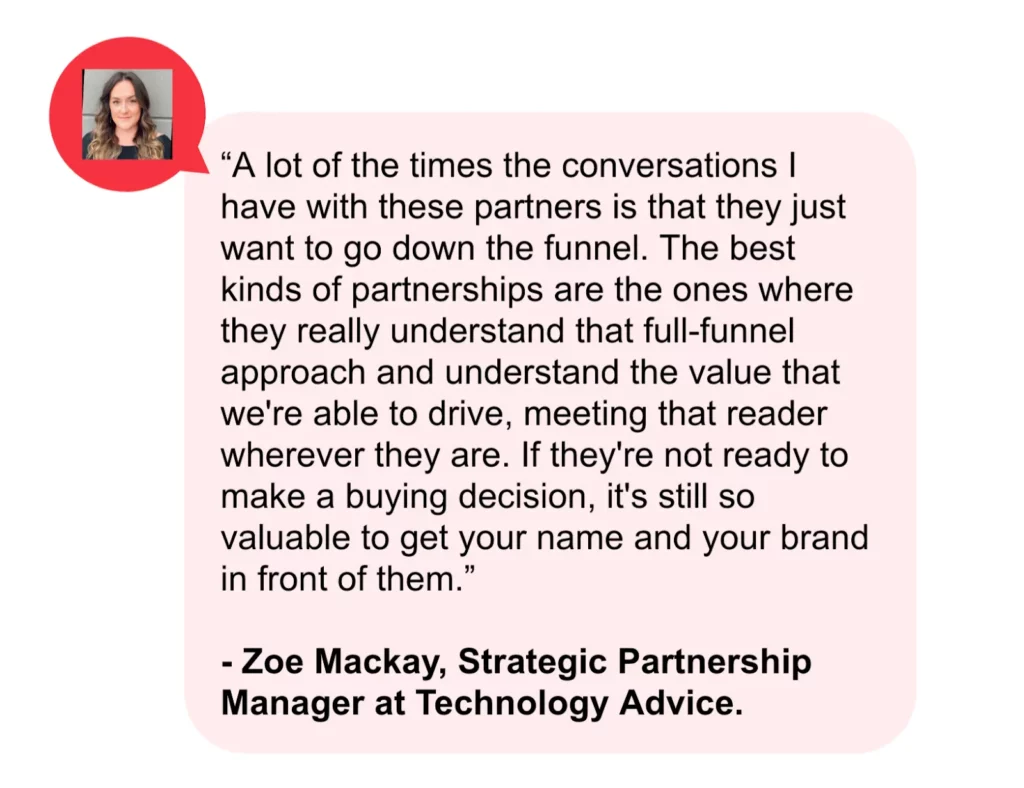
Use the right payment models
For a win-win scenario, consider various payment methods that tailor to your partner’s needs. Affiliate programs generally follow a performance-based payment structure. Brands can pay according to multiple metrics, like each sale, app installation, or per click.
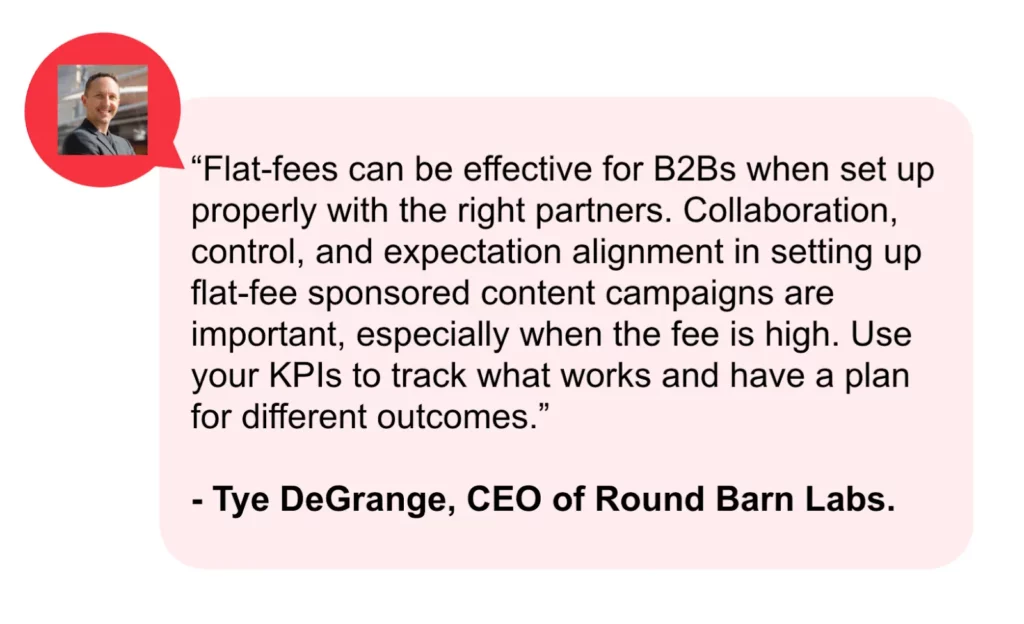
There are multiple touchpoints for B2B consumers before conversion. Tracking the various touchpoints can help you navigate your consumer journey, determine which are the most effective, and give you the best ROI. Many players are involved in the marketing funnel, and it’s important to reward all partners who contribute to the sale.

Final thoughts from the experts
Invest in long-term relationships
Defining your partnership goals is a great start to building a successful affiliate program.
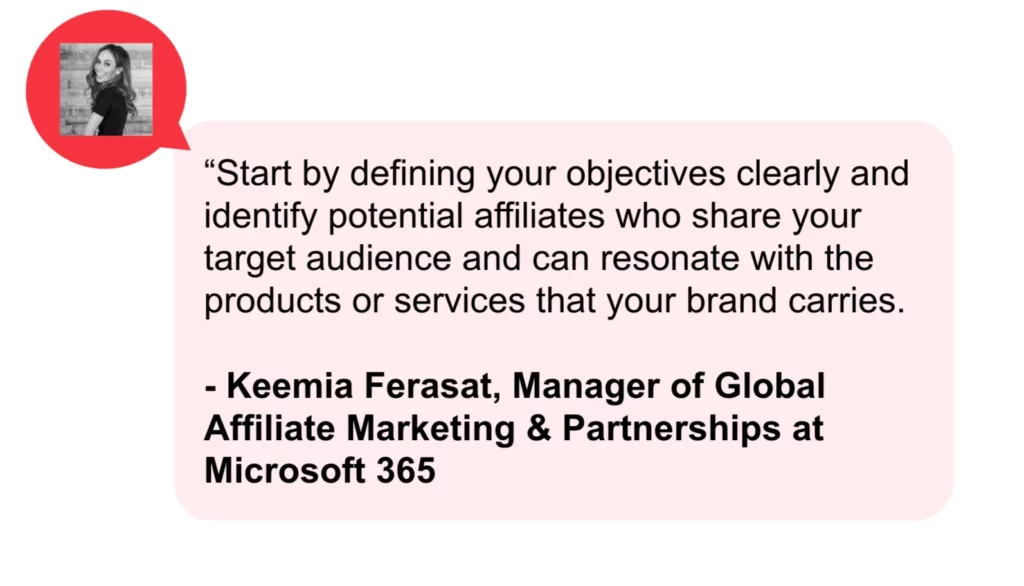
Investing in solid partner relationships from the get go will make negotiations easier.

Zoe reiterates the value of long-term partnerships, particularly for publishers and affiliates.
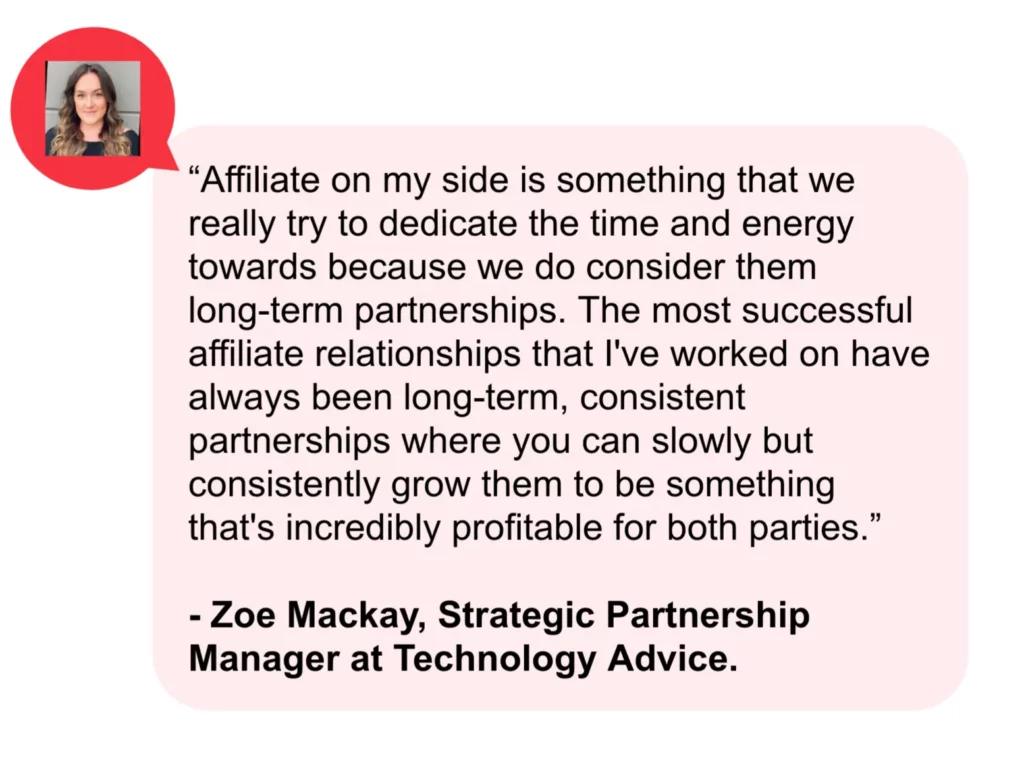
Be patient as results take time
There’s no doubt that affiliate marketing can take a long time to show real value, so patience is key.
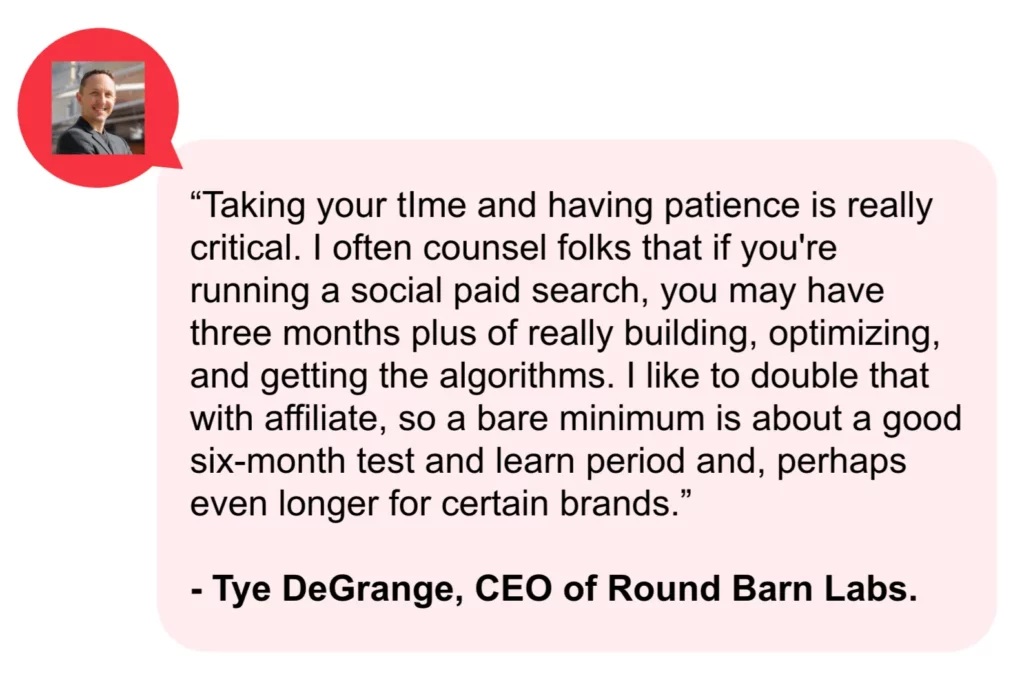
Tye also suggests that brands starting out with affiliate marketing should move slowly and with caution.
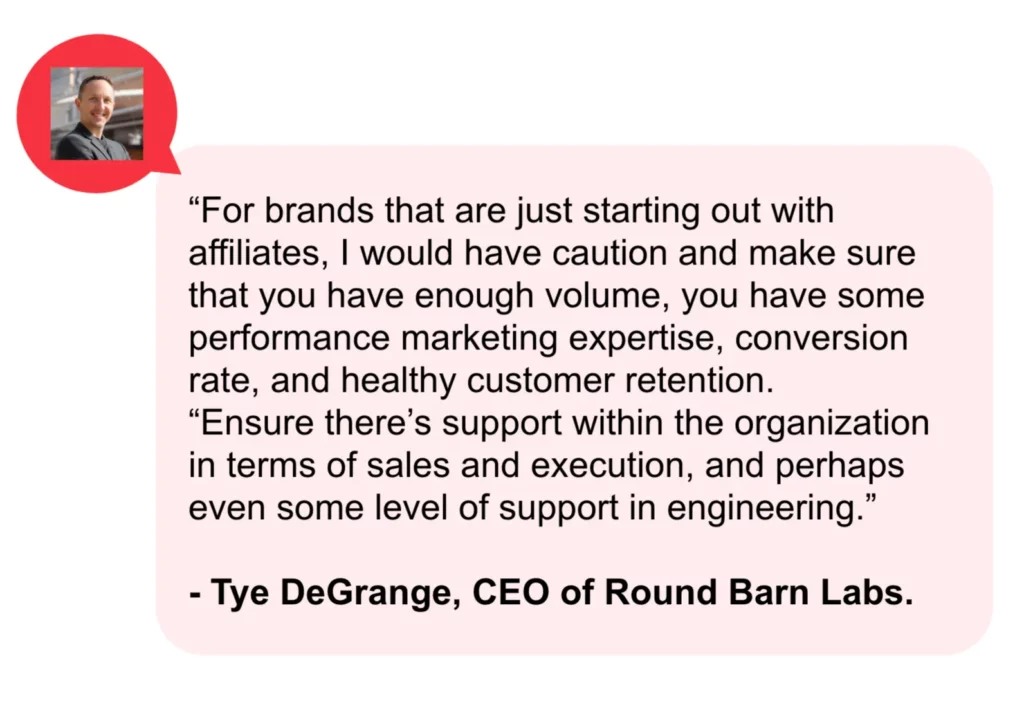
How brands can approach publishers and affiliates
When brands reach out to potential partners, they should highlight what makes them stand out from competitors. It’s also essential to find partners with similar target audiences, goals, and values.
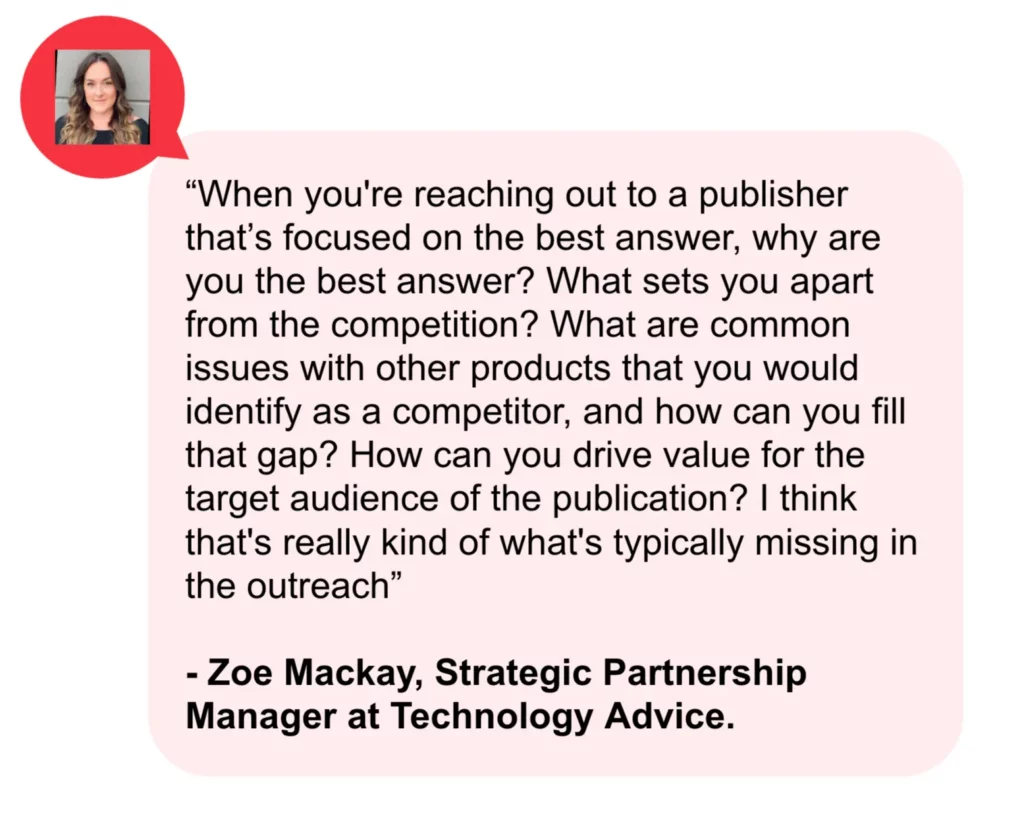
Affiliate marketing substantially boosts revenue for B2B brands, publishers, and agencies
B2B affiliate marketing offers a powerful avenue for brands, agencies, and affiliates to enhance visibility, acquire new customers, and engage with their target audience. Building a successful program requires patience, a focus on long-term relationships, and a data-driven approach. Analyzing the data can help you tailor an effective strategy.
Affiliate marketing is not a one-size-fits-all solution but a dynamic channel that rewards innovation and persistence. The right approach and a commitment to collaboration can make B2B affiliate marketing a significant driver of brand growth and revenue for your business.
FAQ’s
Publishers such as software review sites encourage their readers to purchase products and services from specific B2B companies. Those companies then pay the publisher a commission for each sale or lead they referred.
B2B affiliate marketing is a powerful strategy to enhance your brand’s visibility, gain new customers, and engage with your target audience. It opens doors to reach new demographics, maximizes your ROI, and can provide insight into which touchpoints to invest more in.
Firstly, determine your brand’s goals prior to setting up a program. Then, to set yourself up for success, consider a few factors, such as commission rates, payment models, incentives, quality of affiliates, support provided, data analysis, and agreements. These factors will give you insight into whether the program aligns with your brand’s goals. A partner platform like impact.com simplifies the experience for brands, publishers, affiliates, and agencies to find appropriate partners. Effortlessly manage your whole campaign from start to finish on one platform.





